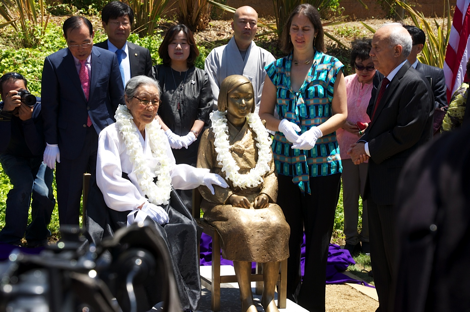
Despite the relative social equality that many Western women are able to enjoy today compared to even a few decades ago, many around the world still live under laws that lack appropriate accountability for violence against women. Not surprisingly, social taboos against reporting these crimes remain high under these circumstances, resulting in a climate that stifles victims' voices and ultimately reinforces such volatile, outdated realities. We are currently witnessing war torn areas with unacceptable levels of violence against women -- one only needs to look towards Syria, Congo, Sudan, and Liberia, for instance, to understand just how grotesquely contemporary this ancient problem actually remains.
One important way to truly embrace progress in this arena is not only to support the victims in articulating their experiences, but also to create a platform of engagement that serves as a permanent educational reminder of humankind's past crimes. Books, films, and works of art can function as imperative tools of historical documentation while becoming a part of our everyday lives. The more we opt to invest in a transparent discourse about subjects that may make us feel uncomfortable, the less likely that underreported crimes against humanity will be swept under the social and legal rugs of history.
The city of Glendale has taken this approach to heart when it comes to crimes against women, specifically regarding sexual slavery and rape as weapons of war. As a memorial and symbol of solidarity with the myriad "comfort women" who served as military sex slaves for Japan during WWII, a bronze statue was installed in the middle of this American city yesterday, despite protests from those who disagree that such allegations are accurate. Glendale, however, is not unaccustomed to calling out history as they see it -- the Armenian Genocide is called just that by the city and is commemorated every year despite it not being "officially" recognized as such by our federal government.
Regardless of one's stance on the issue of comfort women, the decision to erect such a monument is unique and progressive, particularly for a work of public art. Not only is it an elegant and educational way to counter the often jarring denials and Yasukuni visits by various Japanese government officials, it more importantly serves as a borderless symbol against war and tragedy even if that war or tragedy wasn't technically local to the monument site itself.
Though this monument was arranged with assistance from Korean American human rights groups, the context extends beyond the "comfort women" of Korean descent to include the many victims of Chinese, Dutch, Filipino, and Indonesian lineage. And while many of the protesters disagree with the city "meddling" in the affairs of distant countries, they fail to recall that human conflicts are ultimately all-encompassing in today's globalized world -- and art does not have to be burdened with traditional notions of cultural "boundaries."
Nearly 500 supporters from all ethnic and cultural backgrounds attended the dedication of this 1,100-pound statue, a replica of the original memorial in Seoul. While the event's dialogue began with the issue of "comfort women" in Asia, the conversation progressed to encompass further unsettled human rights issues such as Japanese Americans who were forced into internment camps, victims of Armenian Genocide and their relatives, as well as the overall physical security of women in times of war.
This is precisely what the most important works of public art do -- challenge the historical status quo, give silenced victims a voice, and educate future generations about issues both local and global. Despite the fact that many "comfort women" have already passed away at this point in time, without ever obtaining any true peace from their trauma, this monument will undoubtedly serve as a crucial vessel for future generations' memories and consciences.
See more photos on Balance of Culture.